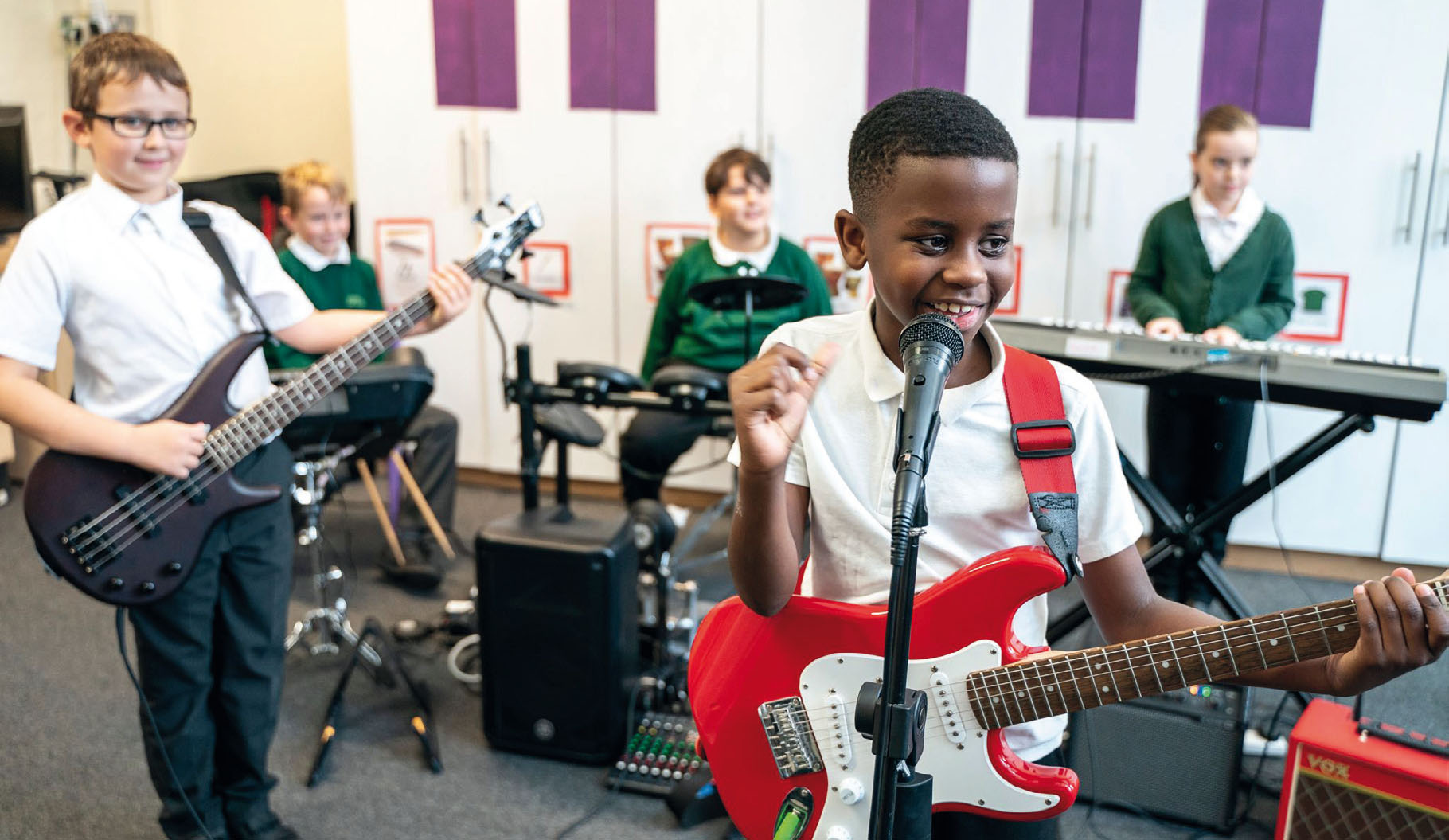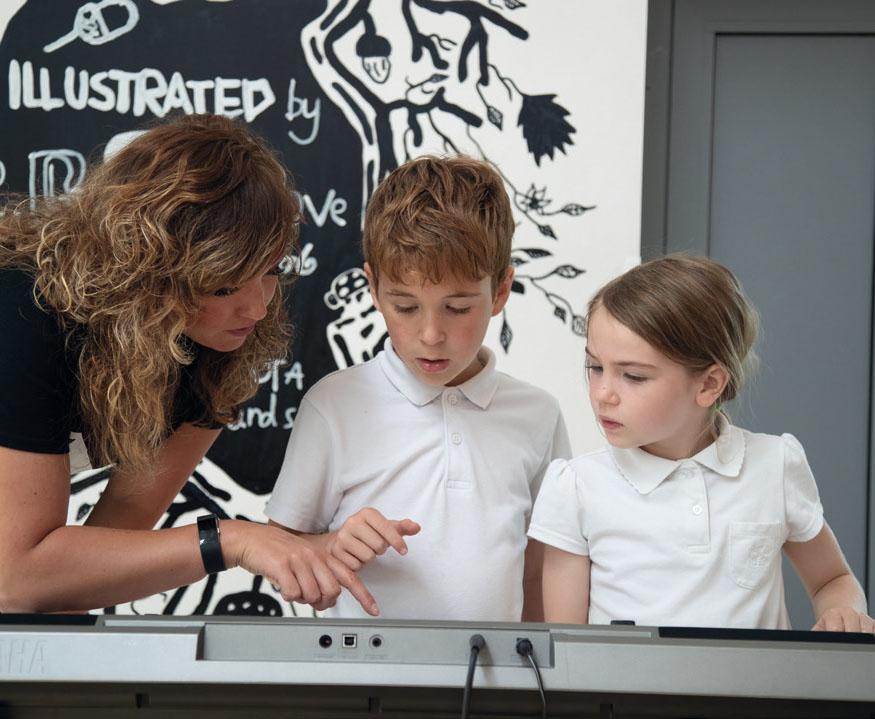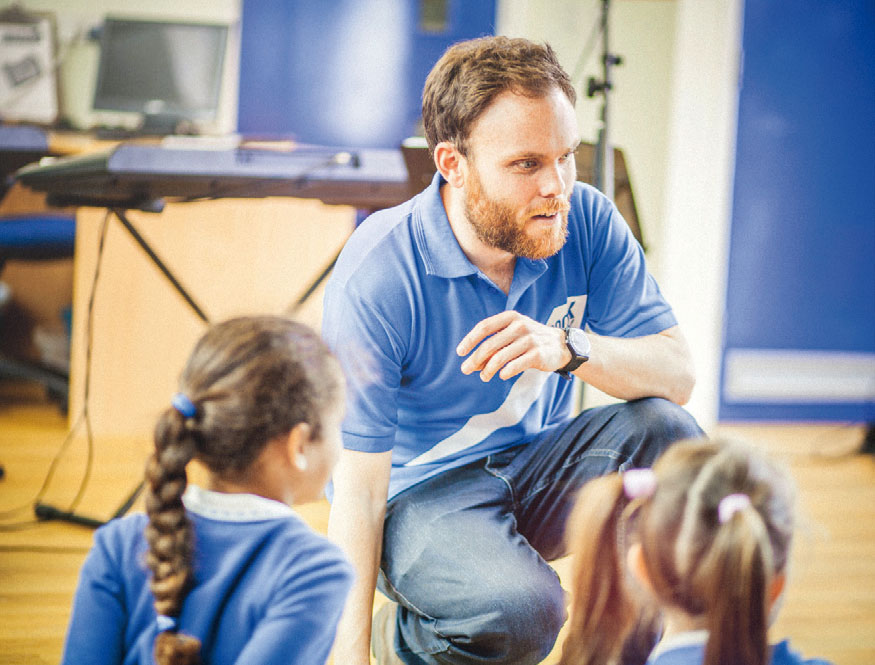
In September 2021, just as Twitter battles were being fought between a major UK exam board and the wider music world about the meaning of ‘musical achievement’, Rocksteady Music School and Trinity College London quietly announced their new exam-free music qualification for primary school children in Years 5 and 6. Of course, they couldn't have known that said exam board would serve up quite such a spectacular faux pas at this precise moment, but it seemed that the woefully misjudged tweet was merely a catalyst for hundreds of people to air their previously pent-up (or, in some cases, well-trod) frustrations about how music is assessed, examined and, ultimately, taught. To summarise: Rocksteady and Trinity's timing couldn't have been more perfect.
On the surface, and for the children participating in Rocksteady's in-school lessons, nothing has changed since enrolment for the qualification began at the start of 2022. Rocksteady band leaders (or tutors) still come into school for weekly band lessons – paid for by parents, bursaries, or pupil premium – and the students still take part in regular performances with their bandmates. But in the background, over 6,000 of these children are being assessed for an Ofqual-accredited qualification equivalent to Preliminary, Grades 1 and Grades 2. Rocksteady has developed technology through which the band leaders can record and monitor a child's progress, gradually allowing the student to ‘unlock’ new levels as skills are observed in lessons.

‘The best way to describe it is that the children won't really know this is happening,’ says Rachel Hawker, director of education at Rocksteady. ‘The way we've designed this whole process is so that no child can “fail”, in the traditional sense. How long it takes a child to complete depends on their starting point, and we're making sure we're observing skills in real-time and that every child is set up for their own version of success.’ Celebrating ‘effort over achievement’ is also central to the qualification, says Hawker, meaning that it's a child's hard work that results in the celebration, and the accreditation at the end is ‘just the extra cherry on top’.
Robust consistency
As admirable as this sounds, in the context of a qualification there's a fine line between accessibility and rigour – a balancing act of which Rocksteady founder and chairman Mark Robinson seems well aware: ‘We always had the challenge of recognising the children's success in a Rocksteady way, because traditional exams don't really fit into our pedagogy. We needed to find a way to record what the students were doing in a really robust way to make sure that what we're saying they're doing, they are in fact doing, and that is traceable, and so on.’ When these internal conversations were happening, the team was already in the process of building new technology to support band leader performance management, which was then adapted for this new purpose.
‘The main challenge was trying to bring in the robust consistency that something like a qualification requires in a way that there wasn't a pass or fail event,’ adds Hawker. ‘We already had the quality assurance frameworks in place, so this was really about bringing together the tech and the quality assurance with Trinity.’ Describing Trinity as ‘forward-thinking enough’ to understand what Rocksteady was trying to do, Hawker continues: ‘We wanted to create this amazing qualification – because giving a child a qualification is something amazing – but to do it in a way that means they don't even know they're doing it, so that Rocksteady still remains about being in a band, having fun with your friends, and learning loads of cool stuff about music.’
As if by magic (from the child's perspective at least), learning this ‘cool stuff about music’ turns into a certificate for a qualification in Music Performance in Bands. Robinson explains that this can happen alongside traditional grade exams that some of the students may also be taking, as the skills gained with Rocksteady are ensemble-specific and are often not explicitly taught until students reach later stages of education. On the qualification, Trinity said: ‘With the advancements of modern music education in a band setting continuing at pace, and with forward thinking, accessible providers such as Rocksteady ensuring increased opportunity across a diverse section of the schools’ sector, Trinity is delighted to have developed this new qualification designed to support inclusive, group-based learning and skills development.’

Rachel Hawker, director of education
Celebrating milestones
Hawker provides a breakdown of the skills being assessed in the qualification, splitting them into three categories: band skills – ensemble work and performance; musicianship – basic music theory, aural awareness; and instrument-specific skills – dependent on whether the child is playing drums, keyboard, vocals, or guitar. The team thinks it will take students between two and four terms to complete the cycle – a point which leaves me wondering whether child could be left behind, their bandmates having received the certificate by the end of the school year but leaving them having not unlocked all of the levels. I am assured that this is not possible:
‘We've got ways of celebrating all of the milestones, and getting these qualifications happens to be quite a big milestone, but we've got a whole bunch of steppingstones along the way,’ says Robinson. ‘It's something we talked about at great length when we were designing this – we wanted to make sure it didn't become something within the leader lessons that left some children feeling worse than they did before.’
Hawker adds: ‘It's always been about removing any barriers to learning and success, so the entire method behind this is about creating an environment in which children are learning and succeeding, and the pressure of whether or not they're getting recognised isn't there for them to feel. It just gives them a really safe environment to learn, make mistakes and learn from them, and continue to become little musicians.’
Great mistakes
While few would deny the need for barriers to learning music to be removed, some may wonder whether a qualification without a pass/fail result might set students up for disappointment and difficulties further down the line. To Robinson and Hawker, I pose the idea that music can often be a ‘safe space’ for children to learn about failure, as they are doing something they love and can still enjoy. Hawker responds: ‘It's not that we aren't giving children a safe space to fail – one of the things we celebrate is great mistakes. If a child makes a mistake, we acknowledge that, so it's not like we're saying that children never make mistakes.
‘I think it's more about it not being a singular event that everything is pinned on – knowing that it's completely fine to fail because it's all part of success, rather than it all leading to this moment where the two options are pass or fail. This kind of route means that children can fail regularly and get back up.’ The kind of failure threatened by exams is very specific, and whether it is helpful or realistic is up for debate. ‘I've always felt that what happens in exams – and this goes for all exams across the board – is that you build this knowledge and skills over a very long period of time, and then there's a singular event where you have to be able to express all of those skills, usually in quite a pressurised environment,’ says Robinson.
‘That is a part of life for some people, some of the time, but you can actually lead a very successful, wonderful, happy life as a musician without coming into contact with that sort of event,’ he adds. ‘Children do unfortunately get to various grades and then give up because the next one looks too hard, so we wanted to smooth out the journey and remove these single events.’ Many of us, having suffered heroically through exam stress only to realise that hardly anything is quite as ‘all-or-nothing’ in ‘real’ life, would advocate for this kind of approach across all school subjects, not just music. ‘We do feel like we're treading slightly new ground,’ says Hawker, ‘which is really exciting, and music feels like quite a good place to start.’

Mark Robinson, founder and chairman
A catalyst for next steps
For now, though, exams as we know them prevail, and one of the pressing challenges for the music education community is the decline of students taking GCSE and A Level Music. ‘We're almost hoping that this [qualification] could be a catalyst for children thinking, “hang on a minute, maybe I can get a qualification in something I absolutely love doing”, and then it could help reintroduce some of those next steps for children,’ says Hawker. Robinson adds: ‘It will take us a few years to see, but we hope it will play a part in that.’
Treading new ground is part of Rocksteady's ethos, and to recognise others who are doing the same, they have this year partnered with the Music & Drama Education Awards to create a new category: The Rocksteady Award for Progressive and Inclusive Music Education. ‘I think it's really important in music education – and all education – to keep taking stock of what's working and what's not,’ says Robinson, when I ask about the new award. ‘We spend a lot of time as an industry making sure we're upholding the standards that are there, which is very important, but we've got to regularly look at what's working for the kids.’
He continues: ‘The decline in uptake in GCSEs is a good example – just hypothetically, if we knocked the whole thing down, how would we rebuild it differently for today? I'm always really inspired by other projects that are rethinking how music education should be delivered and what it should contain.’ The Awards ceremony is taking place on 23 March in London, where the winners of all 15 categories will be announced.
It's early days, but this new qualification seems to be a promising response to the question of ‘what's working for the kids?’, and if receiving a Music Performance in Bands qualification encourages children to take their formal music study beyond primary school, that would surely be an ‘extra cherry on top’.
‘For me, teaching the skills in conjunction with the Trinity accreditations has been a great experience. The progression paths and all the band related skills are a great way for the students to continue to grow and see real-time progress they are making towards each stage and beyond. This assessment format is a brilliant, pressure free way for the students to work at their own pace to master each particular skill, meaning that lessons still remain enjoyable and fun.’– Sam Rothon, band leader
‘I'm in my fifth year of the band leader role at Rocksteady and must have taught well over 1,000 children. Recording skills now is almost seamless in the way it's incorporated into lessons, and it doesn't detract from the fun and fast-paced way we teach. The children's experience of playing in a band remains the same, with all the joy and noise that brings. We have a clearer system of keeping on top of each child's progress, with the older children now having the amazing opportunity to gain a real, certifiable achievement to show for themselves at the end of it. The way we teach produces great, well-rounded musicians, so it's fantastic that their efforts will now come with the official recognition they deserve.’– Samuel Brawn, band leader








